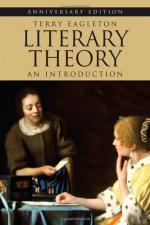
|
| Name: _________________________ | Period: ___________________ |
This quiz consists of 5 multiple choice and 5 short answer questions through Conclusion, Political Criticism.
Multiple Choice Questions
1. According to Eagleton, there are forms of post-structuralism that represent what kind of withdrawal from history?
(a) Intellectual.
(b) Pragmatic.
(c) Hedonist.
(d) Calm.
2. According to Roland Barthes, what kind of sign draws attention to its own arbitrariness?
(a) A healthy sign.
(b) An unproductive sign.
(c) An unhealthy sign.
(d) A productive sign.
3. How did the Romantic artist reflect her or his work in its detachment from history itself?
(a) Because she or he was seen as a consumer of commodities who bought their goods for low pay.
(b) Because she or he was seen as a producer of commodities who sold their goods for high pay.
(c) Because she or he was seen as a minor commodity who existed on the margins of society.
(d) Because she or he was seen as a major commodity who existed within society.
4. For the economist Eagleton discusses, "those economists who dislike theory or claimed to get along better without it" were what?
(a) Had no knowledge of any theory.
(b) In the grip of the most current theory.
(c) In the grip of an older theory.
(d) Didn't understand the importance of theory.
5. Eagleton argues that a literary work in Romantic society becomes what rather than rational and mechanical?
(a) Progressive.
(b) Ideological.
(c) Spontaneous.
(d) Interesting.
Short Answer Questions
1. According to Eagleton, what becomes the "panacea for all problems" as part of the romantics' aesthetic theory at the turn of the eighteenth century?
2. Eagleton writes that his book is less an introduction to literary theory than a what?
3. Who was glad to abandon the "feminine vagaries of literature" in favor of penning war propaganda?
4. According to Eagleton, what is the oldest form of literary criticism?
5. The German philosopher Edmund Husserl argued that objects can be regarded as things ______ by consciousness.
|
This section contains 309 words (approx. 2 pages at 300 words per page) |

|




